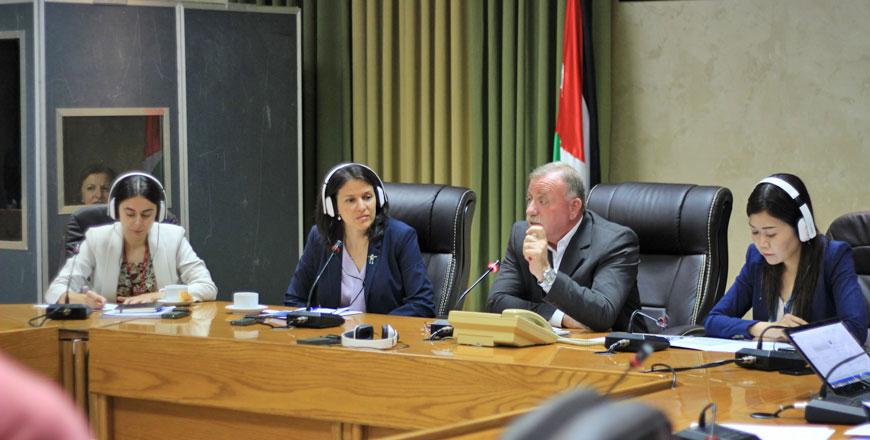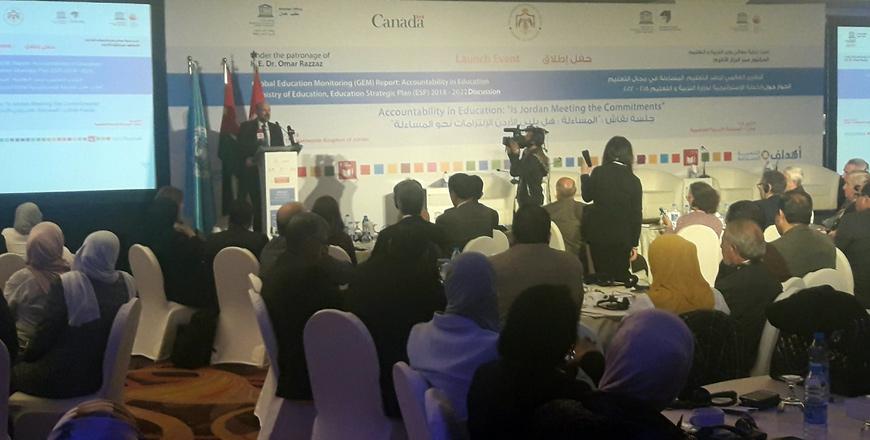You are here
Education Ministry implements gender equality strategy with support from Canada, Norway, UNESCO
By UNESCO - Feb 05,2020 - Last updated at Feb 05,2020

Kafa Akroush, head of the Gender Unit at Jordan’s Ministry of Education, works to spread gender awareness across the education system (Photo courtesy of Kafa Akroush)
AMMAN — Kafa Akroush is head of the Gender Unit at Jordan’s Ministry of Education (MoE). Kafa’s role is complex, and as a former teacher, she takes gender equality in education seriously. Before becoming a teacher, Kafa majored in women’s studies at Jordan University; she has been interested in advancing women’s rights and human rights for as long as she can remember.
“In 2010, the Gender Unit was created at the MoE, attached to the Strategic Planning and Research Directorate. I joined the MoE in 2011. The Gender Unit is very active and we have been enthusiastically implementing the gender strategy and its action plan since January 2019, with support from UNESCO and with funding from Canada,” she said.
In 2018, the MoE developed and began to implement a new five-year Education Strategic Plan (ESP) and a complementary Strategy for Mainstreaming Gender Equality (GE) in Education, with the support of UNESCO and funding from the Government of Canada.
The ESP (2018-2022) and its GE Strategy were informed by an institutional assessment and gender-based analysis plus, and include a clear, prioritised, sequenced and valued set of activities required to achieve the outcomes of the National Strategy for Human Resources Development (HRD).
In July 2019, the Government of Canada announced a further contribution to provide technical assistance to Jordan’s MoE for the Education System Strengthening initiative, in partnership with UNESCO.
These funds seek to support the improvement of evidence-based strategic policy making, planning, monitoring and reporting, and coordination at the MoE — including in the area of gender equality — and are complementary to Canada’s budget support to the MoE.
“The ESP is an ambitious plan and its implementation requires that strong policy, planning, monitoring and evaluation systems be in place. Mainstreaming gender quality in all these aspects is essential to ensure that the provision of quality education services can and will meet the needs of both girls and boys in Jordan,” shared Christopher Johnston, head of cooperation at the Embassy of Canada to Jordan.
“We welcome the leadership of the Ministry of Education in this area and look forward to continue supporting their efforts through the Education System Strengthening initiative,” he added.
Additional support to the Education System Strengthening initiative has been provided by Norway (through NORCAP), with the provision of several experts including senior gender officer, senior data analyst and statistician and internal monitoring and evaluation coordination officer.
“As a strategic partner providing expertise to humanitarian, development and peacebuilding stakeholders, NORCAP is well placed to contribute to this initiative. Gender equality is highly prioritised on our agenda and we are excited to play a part in advancing gender equality and equity within the ministry by mainstreaming gender in the education system. This is an important first step in what we hope will be a fruitful long-term partnership,” said Mari Hagen, NORCAP Project Manager.
UNESCO is currently optimising these contributions towards strengthening the education system, with a particular focus on supporting the implementation of the GE strategy.
UNESCO believes in the transformational power of education. However, this power can only be harnessed if education is of good quality and relevant to the needs of all students — male and female — and is based on human rights, values and principles, including gender equality.
In Kafa’s role at the MoE, she strives to spread gender awareness across the education system.
“It can be very challenging when you see slow progress. The percentage of early marriage has risen in recent years. We have tried to curtail this by conducting informational sessions about this in all public schools,” she said.
The Education System Strengthening initiative bolsters the MoE’s capacity to implement, monitor, evaluate and report on activities and results achieved in the ESP, contributing to the realisation of the 2030 Agenda for Sustainable Development.
Education and gender equality are prerequisites for sustainable development and lay the foundation for a prosperous and democratic society by equally empowering and enabling men and women to participate in social, economic and political life.
Gender equality is a global priority for UNESCO and inextricably linked to its efforts to promote the right to education and support the achievement of the Sustainable Development Goals (SDGs).
Through the Education 2030 Framework for action, SDG 4 aims to “Ensure inclusive and equitable quality education and promote lifelong learning opportunities for all” and SDG 5 to “Achieve gender equality and empower all women and girls”.
UNESCO Representative to Jordan Costanza Farina strongly believes in the 2030 Agenda for Sustainable Development.
“It is important for us to reaffirm our collective commitment to work in a concerted and effective manner towards unlocking progress to realize SDG 4. Central to the 2030 Agenda is the principle of Leaving No One Behind which means reaching the furthest behind first and addressing inequalities,” she said.
Part of Kafa’s task is to support and monitor the work of the gender focal points at the 42 field directorates across Jordan. Recently, a gender audit revealed some significant gaps in gender equality considerations in education.
“Some of the results have shown a gap in leadership with very few females holding decision-making positions in the MoE. Many barriers to women’s success exist and they can be as simple as women not being able to come to a training held on a Saturday because of their family or childcare obligations,” shared Kafa.
“In addition, women who do enter the technical and vocational education stream tend to select specialties that don’t offer significant prospects of employment, like hairdressing or cooking. In a country where women make up less than 15 per cent of the workforce, we must seek to address this issue,” she said.
“Better integration of gender equality considerations in education also aims at addressing specific challenges faced by male students and teachers. For example, while we have observed that the percentage of school enrolment in Jordan is strong compared to other countries — about 97 to 98 per cent until grade 10 — enrolment drops off sharply after that, especially among boys,” Kafa noted.
“Moreover,” she continued, “evidence is showing poorer learning outcomes for boys at all grade levels and in all subject areas compared to girls. These challenges highlight the need to better equip principals and teachers with the required tools and skills to enhance student learning outcomes.”
The leadership and ownership of all components of the Gender Equality strategy remain with the Government of Jordan and the MoE. “Our team is passionate about playing a role in disseminating the GE strategy and feels inspired by its holistic, comprehensive nature,” Kafa said.
“Some teachers may not even know what gender considerations are; from this starting point we are engaging with them about how to become gender sensitive and how to mainstream gender into curriculum. To succeed, we must encourage a change in people’s minds, and I feel strongly that these changes will trickle down to the children,” she said.
Kafa and the MoE share an ambitious task; a goal worth pursuing Kingdom-wide, with ongoing support from, and in partnership with UNESCO, Canada and Norway.
(UNESCO contributed this article to The Jordan Times)
Related Articles
AMMAN — Personnel at the Ministry of Education (MoE) on Sunday began undertaking a technical training on monitoring, evaluation and reportin
AMMAN — The Ministry of Education successfully concluded a two-day policy dialogue with partners and national stakeholders to assess progres
AMMAN — The Ministry of Education (MoE) in collaboration with the UNESCO Amman office on Tuesday launched the Education Strategic Plan (ESP)

















